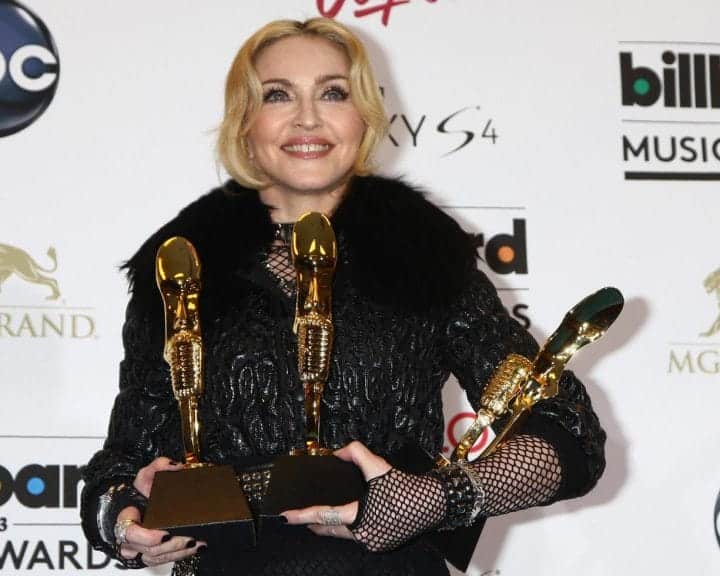The world is buzzing over Lil Nas X, a familiar figure at the center of religious discourse. From the 2021 hit “Call Me By Your Name” featuring the singer giving a lap dance to the devil to his latest single titled “J Christ,” this artist is back, causing controversy among religious listeners.
However, he is not the first or last artist to do so. In this article, we’ll explore 10 artists who boldly represent religion, stirring both admiration and controversy.
1. Lady Gaga
The iconic pop star Lady Gaga is no stranger to controversy. One of the biggest controversies in her career revolves around her 2012 single ‘Judas.
Judas features lyrics and visual references to religious figures like Judas Iscariot, a biblical figure known for betraying Jesus. The chorus sings, “I’m just a Holy Fool, oh, baby, it’s so cruel / But I’m still in love with Judas, baby”
Additionally, the video portrays Lady Gaga as Mary Magdalene, a biblical figure associated with being a follower of Jesus. The video also features dancers dressed in religious attire and includes symbolic elements related to the biblical story. Overall, Gaga uses religious symbolism to narrate a story of loyalty, betrayal, and complex relationships.
The Hollywood Reporter revealed that public radio pulled the song and Lebanon banned it countrywide.
Despite the backlash, Gaga defended the song and the stylistic choices made in the video. In an interview with MTV, Gaga states, “This video is not meant to be an attack on religion. I respect and love everyone’s beliefs. I’m a religious and spiritual person who’s obsessed with religious art. I’m obsessed with it.”
“I believe I was put on this earth to cause a ruckus,” she continued. “At the beginning, when I came out with ‘Just Dance,’ I couldn’t get an interview. … I just want to keep making stuff that’s great and thought-provoking.”
And in regards to the video, Gaga said “Honestly, it came out more incredible than I thought it would. It’s so beautiful.”
2. Kanye West
Kanye West is another public figure who embraces controversy online often. In 2019, West released an album titled ‘Jesus Is King.’ Many publications, including Time Magazine reported as ill-received and seemingly dividing the Christian community
Songs like “Closed on Sunday” elicited many mixed reactions from both religious and non-religious people. Some found lyrics such as “closed on Sunday / you’re my Chick-fil-A” silly, while others found them offensive and controversial. By referencing Chick-fil-A’s practice of closing on Sundays, Christians, and Catholics, in particular, questioned the validity of his faith due to his controversial public persona and past actions.
However, a completely different reason upset others. Some people criticized why Kanye West would publicly endorse a company that has donated $1.8 million to anti-LGBTQ groups despite making promises to stop.
In regards to being canceled, he said in a Hollywood Reporter interview, “Everybody thinks they’re so woke, but they’re following the rules of what woke’s supposed to be. Hip-hop ain’t ever been about following rules. It has been about doing what you feel.” West is still a proud Christian and stands by his work.
3. Sinéad O’Connor
The late Irish singer-songwriter centered many of her songs and music videos around religion. She used her music to criticize the church and reflect on her own experiences with her catholic upbringing. During her 1992 SNL performance, the singer famously ripped up a picture of Pope John Paul II after performing a cover of Bob Marley’s “War.”
The singer received a lot of backlash after that performance. For instance, the crowd at a Bob Dylan concert booed O’Connor, and Frank Sinatra called her “one stupid broad.” Additionally, NBC banned her from ever appearing on the show again.
“I’m an intelligent woman; I knew there would be an aftermath,” said Oconner in an interview on CBS News about the situation.
“The Irish Church took out an insurance policy in 1987 to protect them against claims they foresaw would be being brought by victims… We knew in Ireland 10 years before anyone in America knew.” So, she said in hindsight, she understood that it was an “Adbhorrent idea in America to suggest that a priest could be sexually even molesting a child,”
Despite the backlash, Sinead O’Connor did not regret her choice. She was known for standing up against sex traffickers and child abuse, and she didn’t hesitate to criticize religion when she found it necessary.
4. John Lennon
John Lennon’s song “Imagine” sparked controversy with its opening lyrics, such as “Imagine there is no heaven” and later “and no religion, too,” shocking and offending many. The world divided over whether it was an anti-religious song, making it the center of controversy.
Although the song is timeless, as it is still relevant today over 10 years later, many people still see it as blasphemous and even pro-communist. For instance, According to the LA Times, In 1972, seniors at Denmark High in Green Bay, Wis., voted to make “Imagine” their class song. however, the principal rejected it because he believed the song was “anti-religious and anti-American with communist overtones.”
John Lennon responded to criticisms and interpretations of “Imagine” throughout his lifetime. However, there’s no direct record of him addressing accusations of it being anti-religious. He has discussed the song’s themes and intentions in various interviews, often emphasizing that “Imagine” aimed to convey a message of universal love, peace, and unity rather than being anti-religious or anti-American.
5. Ariana Grande
In 2018, Ariana Grande shook the music scene with her bold single, “God Is a Woman.” This song sparked both admiration and criticism. The song’s provocative chorus, “You’ll believe god is a woman,” ignited a wave of backlash due to its intertwining of religious and sexual symbolism. Although the song debuted at number 11 and later reached a peak of number eight, becoming Grande’s tenth top-10 single on the US Billboard Hot 100, it did not sit well with everyone.
The controversy didn’t stop at the title; the accompanying music video only fueled the fire. Grande took a bold step by incorporating vivid religious imagery. She portrays herself as a deity and even enlists Madonna to recite the Bible verse Ezekiel 25:17. However, a particular scene became the focal point of discussions—a visually striking moment where the singer provocatively sits and interacts with the earth.
These bold artistic choices sparked debates on the intersection of religion and pop culture, stirring conversations about artistic expression boundaries.
Someone even posted on YouTube claiming that listening to the song backward reveals satanic messages. People found the song so offensive that they attempted to have it removed from public radio.
However, Grande spoke up in interviews about the song and the music. She said that she is proud of it and even enjoyed making the parts that were seen as controversial. In a Bustle interview, Grande addresses backlash, stating, “I was expecting it and, of course, understand it … but it’s art. It’s okay if not everybody understands everything I do,” Grande wrote. “I’m grateful for the opportunity to be myself and inspire others to do that as well. I would rather do that than play it safe.”
6. Madonna
Madonna, the iconic pop sensation who has left an indelible mark on the music industry since the 90s, has never shied away from pushing boundaries and stirring up controversy. One of her pivotal moments came in the 1989 release of the groundbreaking hit “Like a Prayer,” which sparked uproar and left an enduring impact on pop culture and societal norms.
In the music video for “Like a Prayer,” Madonna boldly danced in front of a row of burning crosses and engaged in provocative choreography with a portrayal of Jesus Christ, portrayed as a black man. This daring move triggered a significant backlash, with critics accusing Madonna of crossing lines and disrespecting religious sentiments. The video further fueled the controversy by depicting a mixed-race couple and portraying systemic racism within the policing system.
Thirty-four years later, Madonna’s infamous Pepsi commercial, which cost the company a staggering $5 million and was pulled from the airwaves due to the controversy surrounding “Like a Prayer,” resurfaced on the occasion of Pepsi’s 125th anniversary.
Despite its initial banishment, Madonna expressed gratitude on X, thanking Pepsi for resurrecting the long-shelved commercial. She said, “Thank you @pepsi for finally realising the genius of our collaboration. ? Artists are here to disturb the peace.”
Madonna’s refusal to compromise on the controversial aspects of the music video, including scenes of kissing a black saint and burning crosses, played a crucial role in the commercial’s banishment.
7. Tori Amos
Tori Amos, the celebrated singer-songwriter known for her introspective and eclectic musical style, has often explored themes of religion and spirituality in her work. One notable instance is her song “God,” where she incorporates witch imagery to convey a complex relationship with organized religion and her evolving spiritual journey.
She sings the chorus, “God, sometimes you just don’t come through,” while staring at the camera over a candlelight or cradling rats.
In “God,” Amos’s use of witch imagery reflects her symbolic expression of reclaiming and redefining her spirituality outside the traditional constructs forced onto her by her upbringing. The song becomes a poignant exploration of autonomy, self-discovery, and the reconciliation of one’s beliefs.
Amos’s upbringing marked her with a “very severe and authoritarian” connection with religion and God. In her early years, she found the traditional portrayal of God lacking, describing it as that of an “underachiever.” This sentiment reflects her dissatisfaction with the rigid and dogmatic aspects of the religious environment in which she was raised.
8. Sabrina Carpenter
The rising pop star Sabrina Carpenter has grown in popularity since 2022. In her most recent single, “Feather,” she received some criticism due to the music video. In the music video for her most recent single ‘Feather,’ Sabrina Carpenter dresses as a nun and dances in the New York Catholic Church. Although the song has nothing to do with religious imagery, many Christians and Catholics voiced concerns about this choice.
Although many people perceived this as mockery, they were well-received by others. Billboard reported that the priest who allowed Carpenter to shoot the video “was relieved from his administrative duties” after its release. Additionally, in a Variety interview, she responded to the controversy.
Carpenter said, “We got approval in advance,” followed by “And Jesus was a carpenter.”
9. Hozier
Hozier’s breakout hit ‘Take Me to Church’ catapulted him to stardom, garnering mixed reviews from religious audiences.
The chorus, with its repeated plea, “Take me to church,” expresses a longing for a genuine and accepting spiritual experience. The song explores social issues, love, and conflicts arising from clashes between personal beliefs and institutionalized ideologies.
“Take Me to Church” stands as a testament to Hozier’s commitment to addressing societal issues and challenging established norms. The song serves as a bridge between artistic expression and social commentary, inviting listeners to contemplate the complexities of faith, love, and the human experience.
The 2013 music video for Take Me to Church is a critique of Russia’s anti-LGBTQ policy, which the singer-songwriter says some people found controversial at the time.
“Russian state media was sort of doing this whole campaign that tried to equate child abuse with [LGBTQ people],” explains Hozier. “That led to this horrendous rise of attacks by very far-right gangs that filmed these attacks and put them on social media with impunity….”
On social media, Christians spoke about their opinions openly. A Pastor wrote an Open Letter to Hozier, where he critiques and questions the meaning of the song. One part of the letter said,
“Your anger with Russia’s anti-homosexuality laws should have nothing to do with the Church…If you are upset with Russia, write a song about them.”
Despite the backlash, the artist is not afraid to speak out about societal issues that he believes are important, and in fact, he admitted he believes Take Me To Church is more applicable now than it was 10 years ago. “What strikes me is that song is sadly more applicable now than it was 10 years ago.”
10. Davido
The American-Nigerian singer received backlash from the Muslim community. The song Jaye Lo‘s music video offended many Muslims.
The 45-second viral clip of the upcoming music video sparked an online controversy after several Muslims found it disrespectful to their faith. The controversial scene featured some men depicting praying mallams seen dancing in front of a mosque instead of praying. Some Muslim Devotees have seen this dancing act as mocking and offensive.
Many Muslim devotees have labeled the video offensive and are now calling for a retraction while also threatening the artists with a lawsuit. Davido has since reuploaded the video after deleting the controversial Mosque scene.














